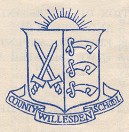|
Address at Steve’s
Funeral, 6th May 2004 Over 50
years ago I was a pupil of Iris Stevenson for three years in the VI form at
Willesden County School and I kept in touch with her in later life. I will speak
as I knew her and hope that my recollections strike a chord with those who knew
her in different places and at different times. Although formally known as Miss
Stevenson, she was usually known as ‘Steve’ (even in the Staff Room) and that is
how I will refer to her today.
Steve taught at Willesden from 1941 until the very late 1950s. The school had
been founded in the 1920s and the founding headmaster, L. F. Wallis, and some of
the original staff were still there when Steve joined. Willesden was an unusual
grammar school; unlike some, it was not based on a public school ethos. Many of
the founding members of staff shared a Fabian outlook; the atmosphere was
relatively relaxed and there was no corporal punishment. Good manners and
politeness were, however, expected. The staff had its fair share of eccentrics.
Steve fitted well in this environment, I’m not saying that she was eccentric,
but she was a little different. Even then there was something of a bygone era
about her manner and her speech. Her dress was unobtrusively smart, her hair
always immaculate, and her voice never lost its slight Scottish lilt. She
retained many mannerisms to the end; when visiting her you didn’t ‘have tea’ you
‘took tea’.
Steve was one of those teachers who can make a lasting impression on pupils. She
taught geography and economics mainly at VI form level at a time when it was
unusual for economics to be taught in schools. Steve’s teaching was lively,
brisk, enthusiastic and effective. But Steve was not a scholar her special
talents lay elsewhere.
Steve actively engaged in extra-curricular activities. She encouraged many of us
to take part in debates. Some of us were fortunate to be taken to the Overseas
Club in St. James where dinner would be followed by talk on current affairs. In
the Christmas holidays we were encouraged to attend lectures on current issues
at the Central Hall, Westminster. The school had a camping site near Princes
Risborough in Buckinghamshire. Steve led one weekend camp and took enough
kippers, at her own expense, for everyone to have them for Sunday breakfast.
Only Steve would have done that.
For me the most enduring legacy of Steve’s out of school activities had been the
visits to Ashridge. Ashridge is a large C19 neo-gothic country house in
Hertfordshire built on a former monastic site landscaped by Capability Brown and
Repton; it is now a management college, but in the late 1940s it ran courses in
current affairs. During the Easter and Summer holidays long weekend courses for
schools were held – about 150 VI formers (both boys and girls) attended – in
addition to lectures there was tennis, cricket, fancy dress competitions and, at
night, unofficial parties in the grounds and much climbing over the vast, often
unsteady, roofs. It was a revelation; I’d never been in such a house before.
I’ve been back many times, and for the past ten years attended a summer school;
this will be the first year that I will not be sending Steve a postcard from
there.
Steve’s greatest contribution was as a careers advisor. Many were helped on the
first steps in their careers; Wally Gilmour, who e-mailed from South Africa a
few days ago, got his first job at the age of 16 following an interview that
Steve asked her brother Edgar to arrange. Increasing numbers went on to
university at a time when only 5% of the age group went there. A high proportion
came from very ordinary backgrounds and were the first in their family to go to
university and benefited from Steve’s much needed advice and encouragement. She
explored options, encouraged, pushed and cajoled and, perhaps most importantly,
persuaded many to raise their sights. Her efforts have resulted in greater
personal fulfilment and, I suggest, a significant contribution to society. I am
often surprised to learn how many from the school have gone on to make their
mark in education, medicine, the armed services, commerce and industry. Not all
of this is due to Steve; others played an important part but, in retrospect, her
contribution stands out. Sadly the school no longer exists – a victim of
changing fashion in education, which we were lucky to avoid.
Steve continued to take an active interest in former pupils, helping one to
change from a career in geography to medicine. Earlier this week I spoke to Joe
Kennedy. On the retirement of Pop Newton, Head of Geography, Steve asked Joe if
he would like to join the staff – he had just completed his teacher training at
the school. He is grateful for the help and encouragement she gave leading to
him becoming a department head in another school.
What then is her legacy? That former pupils here today, and many others,
remember her with respect and gratitude, in some cases 50 years after leaving
school, for teaching us well and taking that extra trouble to give us a good
start in adult life.
If one were to sum her up, in a phrase, I would say that she was dedicated and
inspirational.
May she rest in peace.
Colin Lee
former pupil Willesden County |
